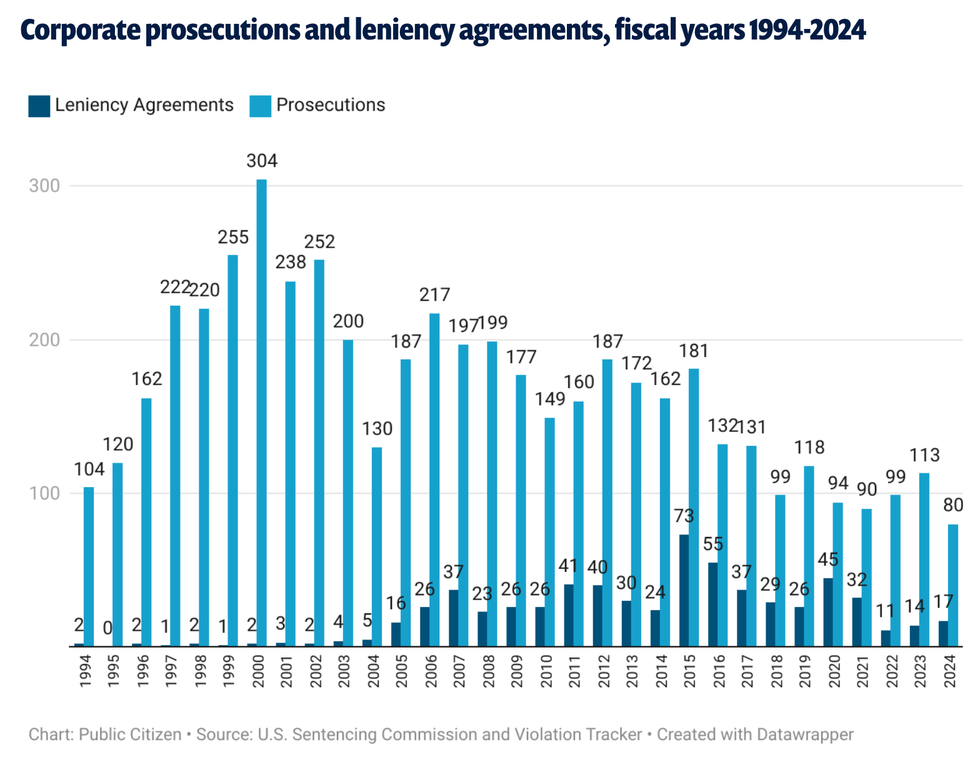During the first six weeks since the inauguration, the researcher found, the Trump administration halted or moved to dismiss actions against 89 corporations—or 25% of the companies in Public Citizen's tracker of prominent cases.
"The consequences for the public when corporations face a diminished threat of enforcement are disastrous," Claypool warned in a statement. "Meanwhile, honest businesses that are not Trump administration insiders—or that refuse to play along with the ultra-MAGA ideological agenda—may face serious disadvantages from Trump's politicized approach to enforcement."
As his report, Corporate Clemency, details, the beneficiaries of the recent dismissals are:
- All 42 corporations facing Consumer Financial Protection Bureau (CFPB) cases and investigations (seven dismissals have been sought so far);
- Twenty corporations facing Department of Justice (DOJ) and Securities and Exchange Commission (SEC) cases and investigations into possible Foreign Corrupt Practices Act violations;
- Eight corporations facing DOJ Civil Rights Division cases and investigations (one dismissal, a case against Elon Musk's SpaceX, has been sought so far);
- Seven corporations facing DOJ Environment and Natural Resources Division cases and investigations;
- Seven cryptocurrency corporations facing SEC cases and investigations, five of which the Trump administration has filed to dismiss; and
- Six employers facing Equal Employment Opportunity Commission (EEOC) cases for discrimination against transgender and nonbinary workers, which the Trump administration has filed to dismiss.
"Additionally, firings of National Labor Relations Board (NLRB) members and EEOC commissioners mean these regulators lack the quorum needed for finalizing enforcement decisions, including NLRB cases against 100 corporations included in the tracker," the report explains. "There are nearly 27,000 open NLRB cases in total."
The corporations that began the Trump administration with the greatest number of probes or cases in the Public Citizen tracker are Musk's Tesla (eight) and SpaceX (four), billionaire Jeff Bezos' Amazon (seven), Big Pharma's Pfizer (five), banking giant Wells Fargo (four), and the insurance company UnitedHealthcare (four).
The report highlights that "of the 361 corporations facing federal enforcement actions, 56 have close ties with the Trump administration," 17 of which "are benefiting from the enforcement pauses that have halted investigations and cases."
The document also identifies 34 companies that collectively gave at least $34 million toward Trump inaugural festivities.
Amazon and Pfizer each gave $1 million, as did many others: Adobe, Apple, AT&T, Boeing, Coinbase, ExxonMobil, Ford Motor Company, General Motors, Goldman Sachs, Google, Hyundai and its affiliate, Johnson & Johnson, Kraken, Lockheed Martin, Meta, Microsoft, OpenAI, Stanley Black & Decker, Stellantis, and Toyota.
Ripple, Robinhood Markets, and Uber gave even more, while Abbott Laboratories, Bank of America, Citibank, Coca-Cola, CoreCivic, Ericsson, Hewlett Packard, and Syngenta gave less or an undisclosed amount.
Apple and OpenAI's contributions came from the companies' chief executives, Tim Cook and Sam Altman, while Uber had a corporate donation and one from CEO Dara Khosrowshahi. All three of them appear on the report's list of "Big Tech oligarchs seeking corporate clemency from the Trump administration," alongside Musk, Bezos, TikTok's Shou Zi Chew, Mark Zuckerberg of Meta—which owns Instagram and Facebook—and Sundar Pichai of Alphabet, the parent company of Google.
"President Trump talks 'tough on crime,'" the report says, "but his administration is once again betraying a preference for going soft on corporations that break the law."
Public Citizen co-president Robert Weissman similarly called out not only Trump—who was convicted of 34 felonies—but also Attorney General Pam Bondi and Federal Bureau of Investigation Director Kash Patel, who all "bloviate about how tough they are on crime."
"The reality is the Trump administration by its actions is inviting a corporate crime spree," Weissman said in a statement. "Not only does the wholesale abandonment of cases against alleged corporate wrongdoers let bad actors off the hook, it invites—and virtually guarantees—a surge in consumer rip offs, endangerment of workers, poisoning of the air and water, discriminatory employment practices, and more."
Public Citizen's analysis comes amid mounting alarm over Trump's so-called Department of Government Efficiency, led by Musk, the richest person on Earth. As Common Dreamsreported Monday, the Center for Biological Diversity noted in a new lawsuit that Trump's executive order establishing the government-gutting initiative requires all federal agencies to form DOGE teams.
The center's complaint stresses that "Mr. Musk and other billionaire and tech executives working with DOGE stand to benefit personally and financially from the DOGE teams' work, including by securing government contracts, slashing environmental rules that apply to their companies, and reducing the government's regulatory capacity and authority, including by targeting specific agencies, statutes, and spending decisions that affect their businesses."



